Laos and JICA 70th Year of "Tying, Connecting, Spinning
2025.01.24
-

- Miyako Kobayashi, Chief Representative, JICA Laos Office
The year 2025 marks the 70th anniversary of the Laos-Japan diplomatic relationship.
This year also marks the 60th anniversary of the inaugural dispatch of JICA Volunteers.
In marking these significant milestones, JICA Laos Office is embracing the motif "Tie, Connect, Spin".
Drawing on the cultural heritage embodied in the stunning traditional textiles of Laos, the two nations are celebrating shared human resource development and co-creation efforts.
JICA hopes that human resources will be assets whose deployment continues to be a driving force that can open new doors of opportunity in this era.
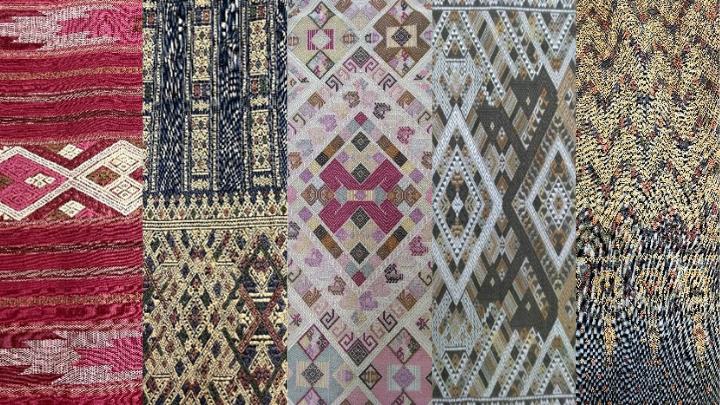
On December 2024, JICA’s female volunteers wore the "Sinh," a national costume woven skirt of bright red, blue, and green fabrics with embroidery and patterns that vary from region to region for a meeting with Lao Prime Minister Sonexay SIPHANDONE.
In fact, the Lao Prime Minister has received a courtesy call from all serving JICA volunteers annually since 2002 with the exception of the COVID-19 pandemic outbreak.
It is a very rare honor for any country's prime minister to receive annual visits from a partner country’s overseas volunteers. This signifies the generosity and hospitality of the government and people of Laos as well as the importance and meaningful nature of the contributions made by Japan’s volunteers in Lao communities.
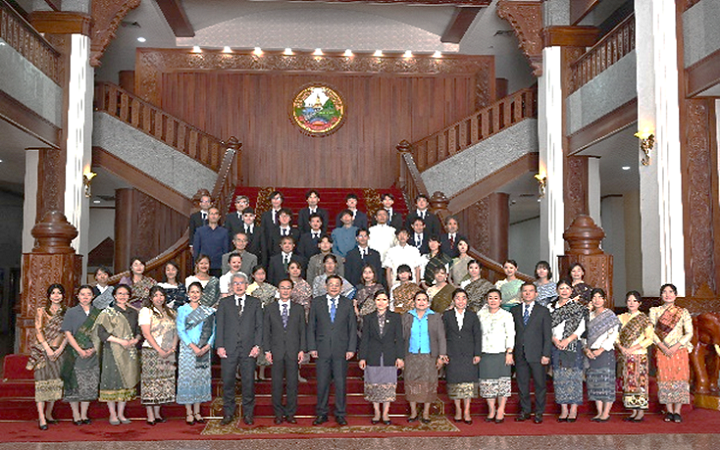
Lao Prime Minister Sonexay SIPHANDONE receives JICA Volunteers’ courtesy call on December 10, 2024.
As you may know, Laos was the first country in the world to welcome Japan’s JICA Volunteers in 1965, and its 60th anniversary is being celebrated in 2025.
Reflecting deeply on this and the 70th anniversary of the establishment of the diplomatic relationship between the two countries this year, Japan Overseas Cooperation Volunteers proposed "Tie, Connect, Spin" as a theme to symbolize this milestone year.
As such, we look anew at the ties between the two countries, considering the connotations of these words that evoke the heritage, skill and process of making beautiful traditional Lao textiles, and the examples that represent them.
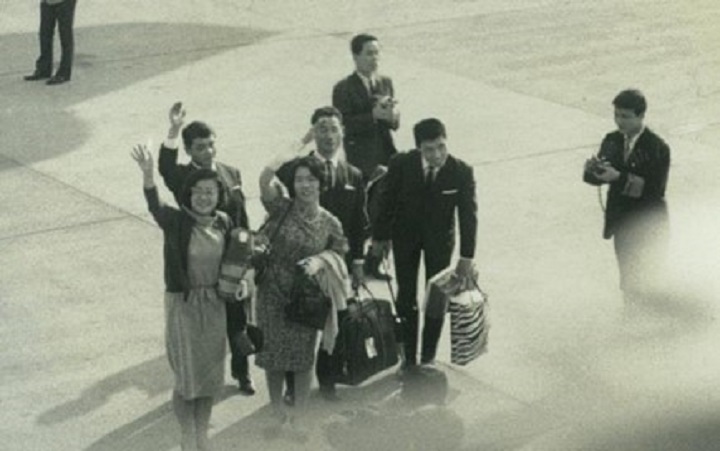
Five members of the world's first group of JICA’s Japan Overseas Cooperation Volunteers (JOCV) arriving at Wattay International Airport in 1965.
Over the years, JICA has supported Laos in a wide range of areas, including infrastructure, legislation, health, agriculture, education and forest conservation.
Infrastructure contributions commenced with the Kaoliao Water Treatment Plant, the first water treatment plant in Laos, in 1964.
Meanwhile, the Nam Ngum Dam, completed in 1971, has played an important role in supporting Laos' development in the years since.
These contributions are reflected in the Lao philatelic and numismatic items. For example, the Pakse Bridge is a symbol reflected on the country’s 10,000 kip banknotes. The National Highway 13 Bridge, National Highway 9, and the Second Mekong Bridge are depicted on Lao postage stamps.
These are just some of the results of projects have been integrated into the daily lives of the Lao people and are enduring symbols of the friendship between Japan and Laos.
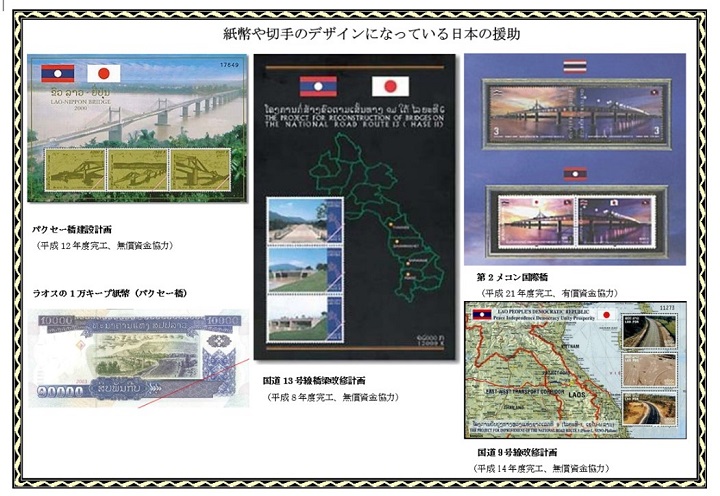
Infrastructure including key bridges and roads constructed with Japanese aid depicted in the design of banknotes and postage stamps.
JICA Volunteers and JICA scholarship students in Japan have long served as key links between Laos and Japan.
To date, a total of 1,094 Japanese civilians have been dispatched to Laos as members of JICA’s Japan Overseas Cooperation Volunteers (JOCV) programs.
The Lao Prime Minister and counterparts often say, "It is thanks to the members of the JICA Volunteer programs that maternal and child health care, including the maternal and child health handbook, has become widespread in Laos.
The members of the program are the "treasures" of Japan and Laos," whose contributions have been engraved in the hearts of those involved”.
The participants continue to work in many fields, including education, nursing, midwifery, water quality testing, and community development, sharing their knowledge of Japan, understanding Lao culture and lifestyle, and building ties with Japan.
After completing their volunteer contributions, many former members are still active in both Laos and Japan.
Some manufacture and sell clothes and sundry items made from Lao cloth; others operate cafes and restaurants featuring Lao and Japanese food and more.
In addition, 660 Lao students have studied in Japan through JICA’s scholarship program.
After returning home, these students have been active in the government, educational institutions and private companies, playing an important role in further deepening exchanges between the two countries.
Currently, the Minister of Education and Sports, the Minister of Health, and the Vice Minister of the Ministry of Planning and Investment are among those who have studied in Japan.
Many key government officials are capable in the Japanese language and knowledgeable about opportunities for collaboration.
These people-to-people networks are the foundation for "connecting" the future of Laos and Japan, and for nation building in Laos.
Just as traditional Lao textiles weave beautiful cloth by spinning threads and yarns of different colors, JICA's support brings together people and organizations (threads) to create new value (cloth). At its core is the philosophy of "co-creation," in which JICA collaborates with international organizations, private companies, local governments, universities, NPOs, and NGOs to carry out a variety of activities.
Forest conservation efforts from 2015 to 2018 successfully helped Lao PDR achieve its emission reduction targets. Laos PDR is expected to receive up to $45 million from the Green Climate Fund's REDD (Reducing Greenhouse Gas Emissions from Deforestation and Forest Degradation) and Payment for Results programs.
Meanwhile, math textbooks used in all primary schools throughout Laos were developed in collaboration with a private Japanese textbook company.
Other projects include the design and development of tourism products through grassroots technical cooperation by Nagaoka Institute of Design and Technology, the promotion of social participation and para-sports for the disabled through the reconstruction of the Chao Anouvong Stadium in Vientiane with ADDP (NPO), and water supply projects with local governments in Saitama Prefecture, Saitama City, Kawasaki City, and Yokohama City.
In addition, the Kagawa Farmers Cooperative has established an agricultural corporation in Xieng Kuang Province to support creation of agri-business by technical intern trainees after their return from Japan.
This promotes the formation of production areas for agricultural products from Laos destined for export to Japan.
In this way, valuable opportunities are emerging in Laos through co-creation with various Japanese partners over a long period of time.
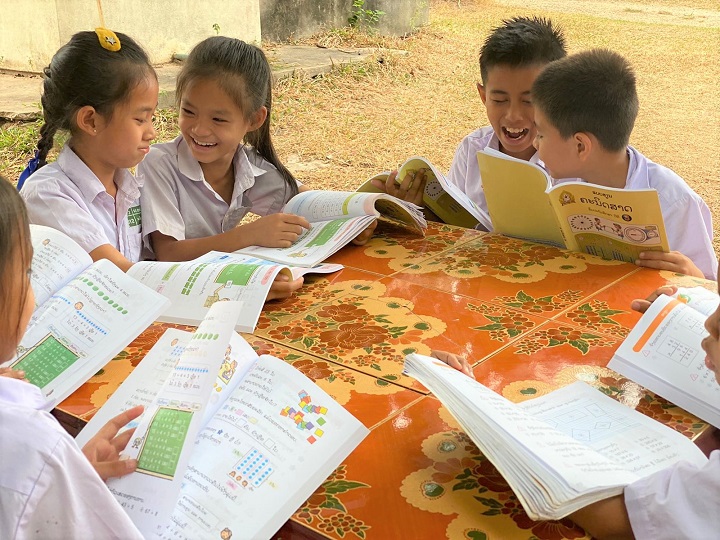
Primary school students learn mathematics lessons from textbooks jointly developed with a Japanese textbook publisher.
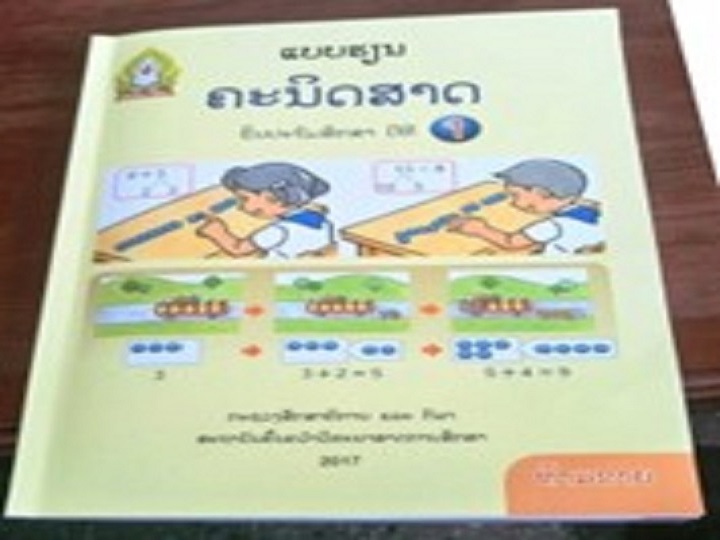
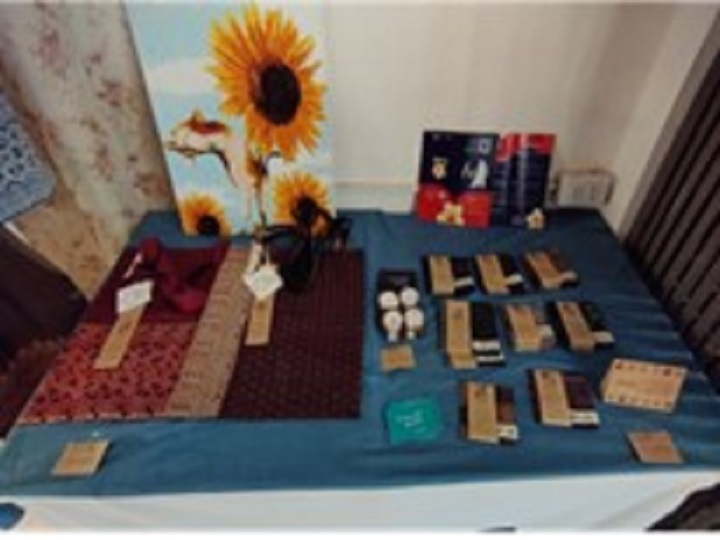
One-of-a-kind tourism products designed by villagers. Learning to reuse "Sinh" with insights from Nagaoka Institute of Design and Technology.
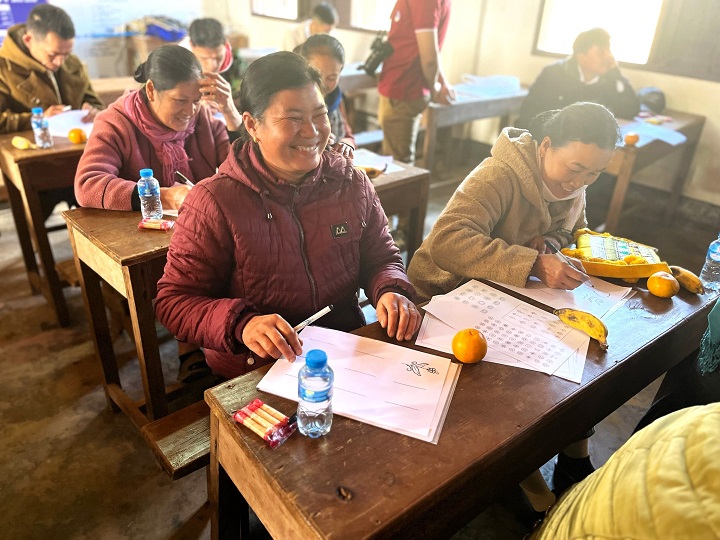
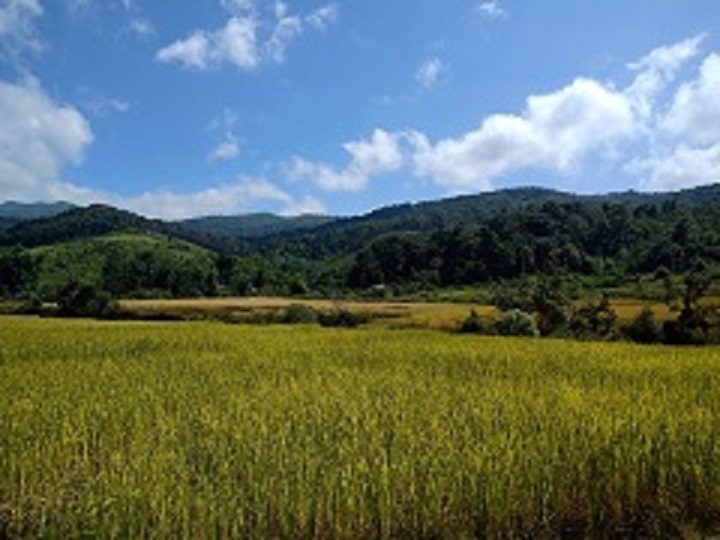
Rural landscape of Xieng Kuang Province.
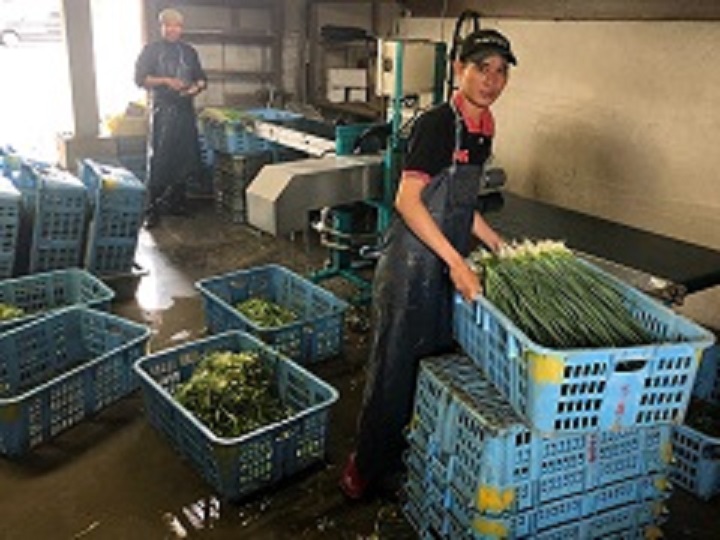
Technical intern trainees working in Kagawa Prefecture.
Laos is facing a severe fiscal situation, with external public debt currently sitting at 108% of GDP (IMF, 2024).
As part of expenditure reduction measures, spending on social sectors such as education and health has been reduced to just 0.7% of GDP.
However, from a medium-to-long-term perspective, human resource development is increasingly important as a foundation for economic and social development.
The history of JICA in Laos can be seen as a history of human resource development.
Through their varying contributions, our shared values have been woven together to further strengthen the relationship between the two countries.
The many individuals and teams whose contributions have connected Laos and Japan, including JICA volunteers, students, counterparts, experts, and consultants, are celebrated as "treasures" for both Japan and Laos.
We believe that these "human resources" will continue to be a driving force, opening up the opportunities to strengthen cooperation and socio-economic development in each new era.
scroll